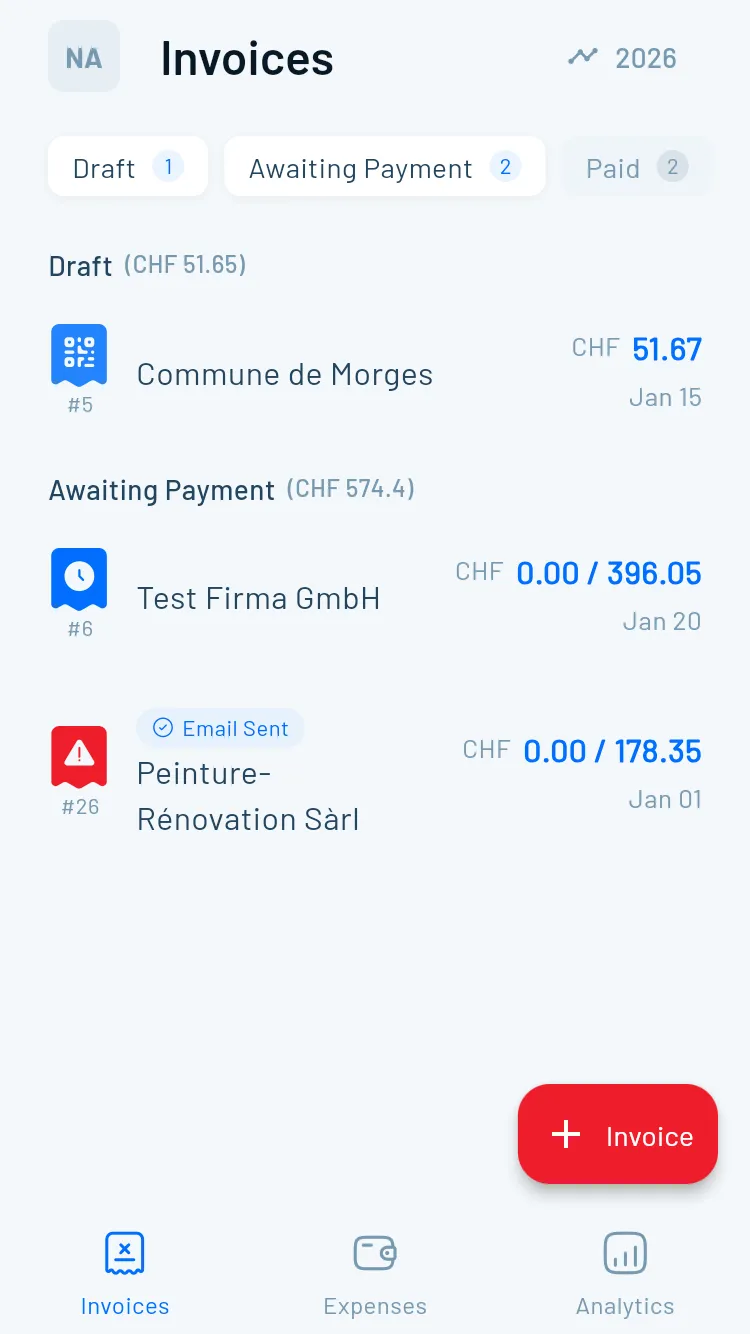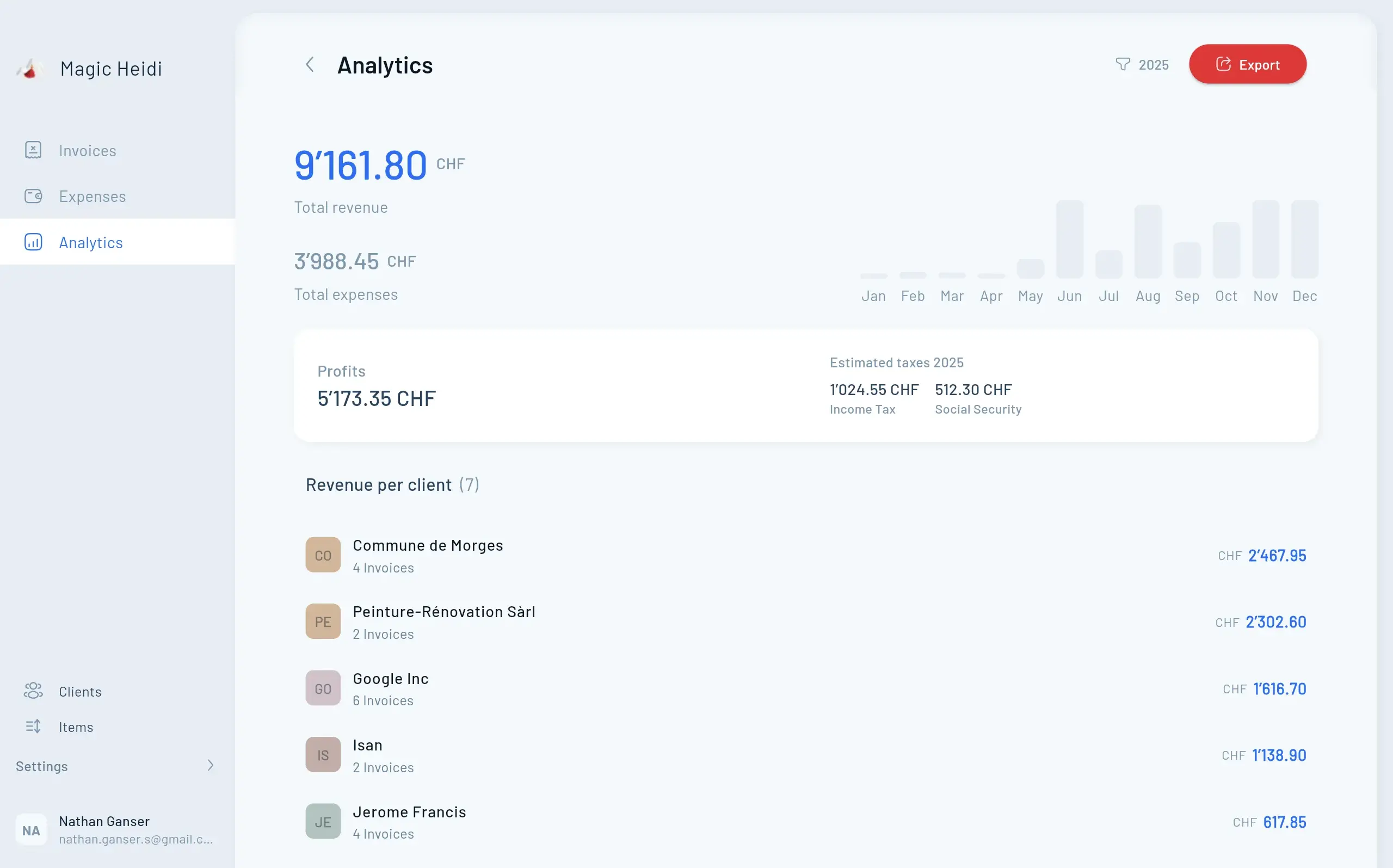Best For: Small to medium businesses (5-50 employees) needing comprehensive features
With 90,000+ Swiss SMEs using their platform since 2013, bexio dominates the market. Owned by Mobiliar insurance since 2018, they offer cloud-based accounting with strong Swiss compliance features.
Key Features:
- Complete double-entry bookkeeping
- QR-invoice generation and processing
- Integration with 40+ Swiss banks
- Multi-currency support
- Project management and time tracking
- CRM and contact management
- Mobile apps for iOS and Android
Pricing:
- Starter: CHF 29/month (1 user)
- Standard: CHF 49/month (3 users)
- Professional: CHF 99/month (10+ users)
Swiss Compliance: ✓ VAT management | ✓ QR-bills | ✓ Swiss bank integration | ✓ Double-entry bookkeeping
Limitations: Can be overwhelming for solo freelancers; pricing increases significantly with additional users.
Compare bexio alternatives →
Best For: Freelancers and small businesses wanting simplicity with official backing
As a Swiss Post subsidiary, KLARA Business AG combines reliability with user-friendly design. Their AI-powered receipt scanning saves significant time on expense management.
Key Features:
- Automated receipt scanning with OCR
- Bank connection to 40+ Swiss banks
- Simplified VAT reporting
- QR-invoice support
- Mobile-first design
- Expert support in German, French, Italian
Pricing:
- Starter: CHF 19/month
- Business: CHF 35/month
- Business PLUS: CHF 55/month
Swiss Compliance: ✓ VAT management | ✓ QR-bills | ✓ Swiss bank integration | ✓ Double-entry bookkeeping
Strengths: Excellent for non-accountants; intuitive interface; strong mobile experience.
Best For: Startups and bootstrapped businesses needing professional features without monthly fees
Based in Münchenstein, Basel, CashCtrl offers a genuinely functional free tier—rare in Swiss accounting software. All data, development, and support stay in Switzerland.
Key Features:
- Financial accounting and accounts receivable
- Master data management
- VAT calculations and reports
- Multi-currency support
- Various financial reports
Pricing:
- FREE: CHF 0 (limited to basic features, permanently free)
- PRO: CHF 340/year (one-time annual payment)
Swiss Compliance: ✓ VAT management | ✓ QR-bills | ✓ Swiss hosting | ✓ Double-entry bookkeeping
Limitations: Free version limits transaction volume; interface less modern than competitors.
Value Proposition: Ideal for testing accounting software without commitment or operating on minimal budget.
Best For: Companies wanting established reliability or startups needing affordable entry
Abacus pioneered Swiss business software and now offers multiple tiers: AbaNinja for small companies, AbaWeb for growing businesses, and Abacus for enterprises.
Key Features:
- Comprehensive ERP capabilities
- Payroll integration
- Inventory management
- Document management system
- Multi-company support
Pricing:
- AbaNinja Starter: Free (limited features)
- AbaNinja Business: CHF 21/month
- AbaWeb: From CHF 18/month
- Abacus Enterprise: Custom pricing
Swiss Compliance: ✓ VAT management | ✓ QR-bills | ✓ Swiss bank integration | ✓ Double-entry bookkeeping
Strengths: Scalable from freelancer to large SME; deep Swiss market knowledge.
Best For: Swiss freelancers earning CHF 50,000-500,000 annually who want Swiss-specific features without complexity.
Built specifically for Swiss freelancers by a Swiss freelancer, Magic Heidi focuses exclusively on solo professionals rather than trying to serve everyone from sole proprietors to 50-person teams. The interface stays clean, features remain relevant, and you're not paying for payroll modules or inventory management you'll never use.
Key Features:
- QR-code invoice generation with 2025-compliant structured addresses
- AI-powered receipt scanning (photograph receipts, automatic categorization)
- Swiss VAT rates built-in with quarterly reporting
- Currency conversion to CHF for international clients
- Bank statement import from major Swiss banks
- Tax estimation based on actual revenue and expenses
- Data hosted on Swiss servers in Zurich
- Full support in German, French, Italian, and English
- Native apps for iPhone, Android, Mac, and Windows
Pricing:
- Free trial: 3 invoices and 3 expenses
- Annual: CHF 24.99/month (billed at CHF 299/year)
- Monthly: CHF 30/month
Swiss Compliance: ✓ VAT management | ✓ QR-bills | ✓ Swiss bank integration | ✓ Swiss data hosting
Limitations: No payroll processing, single-user focus, limited inventory management. Better suited for service providers than product sellers.
User experience: Setup takes 15-20 minutes. Most freelancers send their first QR-invoice within an hour of signing up.
Try Magic Heidi free →
Best For: Brand-new freelancers with minimal transactions or those wanting desktop software rather than cloud.
A Swiss classic on the market since 1990, Banana Accounting offers a spreadsheet-like interface familiar to Excel users with professional accounting structure underneath.
Key Features:
- Truly free tier for very small operations (up to 70 transactions)
- Desktop software (no recurring internet connection needed)
- Spreadsheet-like interface familiar to Excel users
- Suggested for turnover up to CHF 100,000
Pricing:
- Free (up to 70 transactions)
- From CHF 89/year for paid versions
Swiss Compliance: ✓ VAT management | ✓ QR-bills | ✓ Double-entry bookkeeping
Limitations: Desktop-only (limited mobility), transaction limits on free tier, no payroll accounting, less modern interface, manual updates required, limited automation compared to cloud solutions.
Value Proposition: Reliable transitional tool from spreadsheets before committing to a monthly cloud subscription. Good for freelancers who prefer working offline.
Best For: Businesses needing highly customized chart of accounts and specific workflows
Crésus offers exceptional flexibility in tailoring your accounting system to Swiss company needs, with fully customizable charts of accounts.
Key Features:
- Fully customizable accounting structure
- Multi-company management
- Salary management integration
- Available in all Swiss languages
- Desktop and cloud options
Pricing:
- Purchase: ~CHF 600 (one-time)
- Rental: ~CHF 20/month
Swiss Compliance: ✓ VAT management | ✓ QR-bills | ✓ Customizable to Swiss standards | ✓ Double-entry bookkeeping
Best For: Companies with specific industry requirements or complex accounting needs.
Best For: Growing businesses needing accounting, inventory, and invoicing in one system
Winbiz provides complete ERP functionality beyond accounting: inventory management, customer invoicing, and payroll—all in four languages.
Key Features:
- Integrated inventory management
- Customer and supplier management
- Payroll processing
- Project accounting
- Available in French, German, Italian, English
Pricing: Custom pricing based on modules and users (contact for quote)
Swiss Compliance: ✓ VAT management | ✓ QR-bills | ✓ Swiss standards | ✓ Double-entry bookkeeping
Ideal For: Retail and wholesale businesses managing physical inventory alongside accounting.
Best For: Tech-forward businesses wanting automation and modern interface
Founded in 2016 in Zurich, Accounto brings AI and OCR technology to Swiss accounting, focusing on automation and efficiency.
Key Features:
- AI-powered document recognition
- OCR technology for receipts and invoices
- Real-time financial dashboards
- Collaborative features for teams
- API integrations
Pricing:
- Small/Medium Business: CHF 49/month
- Accountant Package: CHF 200/month
Swiss Compliance: ✓ VAT management | ✓ QR-bills | ✓ Swiss bank integration | ✓ Double-entry bookkeeping
Differentiator: Modern tech stack appeals to digital-native businesses; strong automation reduces manual entry.
Best For: International companies operating in Switzerland needing global consolidation
Major international platforms have adapted for Swiss markets, but with varying success.
Considerations:
- Often require plugins or workarounds for Swiss compliance
- Bank integrations may be limited
- QR-bill support added as afterthought
- VAT rates and formats require manual configuration
- Support teams less familiar with Swiss requirements
When to Choose International:
- You operate in multiple countries requiring consolidated reporting
- Your parent company mandates specific software
- You have accounting expertise to handle Swiss adaptations
Reality Check: Most Swiss businesses find local solutions more efficient for day-to-day operations.


